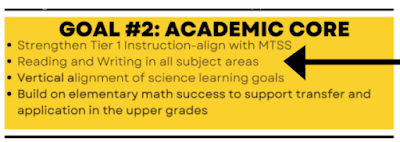This year, one of our focus areas in the goal area of Academic Core is to increase the amount of reading and writing in all subject areas.
Writing to learn is a great way to support students in engaging with and thinking about the key concepts in any and all subject areas. Building classroom routines that provide time for students to explore ideas through writing in a low-stakes environment builds stamina, confidence, and increases the quality of understanding.
Today's blog includes some writing prompts for elementary, middle grades, and high school. Prompts are a great starting point, and these prompts encourage students to write creatively, persuasively, informatively, or share an opinion. After writing, students can share with partners or a small group. Some pieces of writing may become a future artifact of evidence of learning. These prompts have been curated from the following sources:
Todd Finley, We Are Teachers, TeachThought, Scholastic, Birmingham City Schools, College Transitions, The New York Times, Monte Syrie, Texthelp, and PBS Above the Noise
Writing isn’t just a tool for language arts—it’s a vehicle for critical thinking, self-expression, and deep comprehension across all disciplines. From science to math, social studies to the arts, incorporating writing into daily practice helps students process information more effectively, develop their voice, and engage in higher-order thinking. By incorporating writing into our regular practice, we can support our students to not only become better writers, but also deeper thinkers.

.png)
